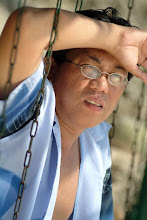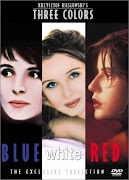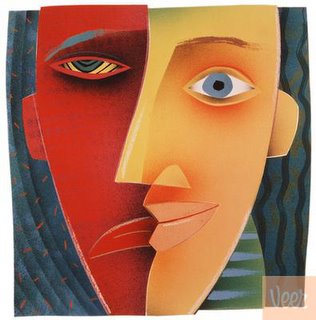 WHAT MAKES US TICK as a people may make some of us feel sick. So goes the crux of my column tomorrow in Sun.Star Cebu: It's as awry as a sore thumb sticking out, but mirth in the face of misery is one peculiarity so patently Pinoy. Absurd enough, true, to baffle even the Greeks who symbolized theater as a tragicomic pair of masks.
WHAT MAKES US TICK as a people may make some of us feel sick. So goes the crux of my column tomorrow in Sun.Star Cebu: It's as awry as a sore thumb sticking out, but mirth in the face of misery is one peculiarity so patently Pinoy. Absurd enough, true, to baffle even the Greeks who symbolized theater as a tragicomic pair of masks.
Consider, for instance, those television footages straight from an accident or crime scene. See how the reporter intones the ill-starred subject of the story while a bustle of kibitzers at the background jostles for their fair share of the camera, waving and winking or striking a chin-up pose worthy of Mr. Suave. That happened, yes, in the wake of the Wowowee stampede. A grinning face or two, that’s also starkly visible in the front-page photo of the Philippine Daily Inquirer yesterday counterpointing the utter despair of those waiting for upbeat possibilities about survivors in the Southern Leyte landslide.
Here’s where the Grim Reaper seems to have trouble with being taken seriously. As if tragedy were a freak force of nature, a pratfall or an outlandish piece of rumor out of a clown’s lopsided mouth.
In this grin-and-bear-it country where stand-up comics are more compelling than politicians and where cartoonists can best interpret our socio-economic state, being hapless is something most of us endure with unbearable lightness. As if, on the heels of man-made or natural disasters with a ho-hum rate of recurrence, yet another sorrow can be shrugged off thus, “So what else is new?”
Be merry today, tomorrow is another sloppy trick up a freak’s sleeve. Or so many of us with a happy-go-lucky binge seem to believe. Recall a recent article from Time Magazine, explaining why Filipinos consistently top national happiness surveys compared with the rest of the world despite poverty, calamities and countless other reasons to wallow in the slough of despond. We can even die laughing.

We’re gracefully tough as the bamboo, true. We suffer fools gladly, and we can win Olympic medals if being easily amused and self-sufficient were up for competition.
"Around the world, people are searching for happiness,” writes Alan C. Robles. “For Filipinos, happiness isn't a goal: it's a tool for survival.”
The Flintstones might as well be Filipinos, who knows?
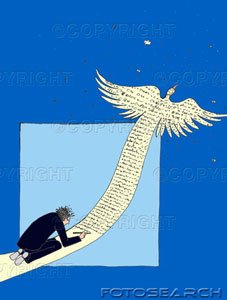 DON'T WORRY, WRITE POETRY. And be happy. That, in a nutshell, is the eyebrow-raiser out of the Independent Online Edition written by Christina Patterson. Read on:
DON'T WORRY, WRITE POETRY. And be happy. That, in a nutshell, is the eyebrow-raiser out of the Independent Online Edition written by Christina Patterson. Read on:
Poetry is good for your health. That, at least, is the premise of studies currently under way for the Arts Council and the Department of Health. One study, published a couple of years ago in the journal Psychological Reports, suggested that writing poetry boosted levels of secretory immunoglobin A. Another, undertaken by a consultant at Bristol Royal Infirmary, concluded that poetry enabled seven per cent of mental health patients to be weaned off their anti-depressants. Poetry, it seems, is not the new rock'n'roll, but the new Prozac.
This was not instantly evident at the ceremony for the TS Eliot poetry prize last week. Perhaps it was the strip-lighting, but the assembled throng of pasty faces and panda-shadowed eyes did little to foster a sense of radiant health. As feel-good events go, it ranked just above a tussle with your online tax return, but probably below a Thai takeaway in front of Celebrity Big Brother. It was, of course, not fair of Cyril Connolly to describe poets as "jackals fighting over an empty well", but it is true that £10,000 prizes do not, on the whole, boost the health and happiness of those who don't win.  The prize, in any case, went to a paean to psychosis. Carol Ann Duffy's collection of love poems, Rapture, is a moving and, at times, skin-crawlingly accurate portrayal of a process that psychologists have recently identified as a form of madness. We have all been there: tending the mobile "like an injured bird", repeating the name "like a charm, like a spell". For most of us, falling in love is a season in what Duffy calls "glamorous hell", and not a sojourn. We might suffer a few sleepless nights, or even eat a bit less than usual, but we can't sustain life at this pitch. And, luckily for us, our minds comply.
The prize, in any case, went to a paean to psychosis. Carol Ann Duffy's collection of love poems, Rapture, is a moving and, at times, skin-crawlingly accurate portrayal of a process that psychologists have recently identified as a form of madness. We have all been there: tending the mobile "like an injured bird", repeating the name "like a charm, like a spell". For most of us, falling in love is a season in what Duffy calls "glamorous hell", and not a sojourn. We might suffer a few sleepless nights, or even eat a bit less than usual, but we can't sustain life at this pitch. And, luckily for us, our minds comply.
Many poets - a higher proportion, apparently, than of the average population - are not so lucky. John Clare, Anne Sexton, Robert Lowell and, most famously, Sylvia Plath, all knew the torments of a mind that would, on occasion, burst out of the crucible of what Freud called "normal human misery" into the nameless horrors of mania. The mad poet may be a cliché, but it is not a myth. Poets continue to write of their experiences of mental illness. If poetry is some kind of wonder-drug, it sure ain't working for them.So who is making these headline-hitting assertions, and why? The answer, of course, is arts administrators, and they're doing it for money. And kindness, and the philanthropic impulse, and passion and a desire to help the lost and the lonely and the miserable and the mad. But, to do all this, you need money, and to get money you need to go to funders, and to go to funders you need studies, evidence, and results.
A current project is a good example. Poems in the Waiting Room was set up by an enthusiastic  social worker eight years ago. Run, like most of these things, on a shoestring, it has had little pots of funds from trusts and foundations as well as the Arts Council, the Poetry Society and the Foreign Office. It aims are, you'd have thought, worthy and modest: to cheer up miserable places (hospital waiting rooms) at an anxious time with a little injection of art.Their online "evaluation," however, tells a different story. Amongst a dizzying range of aims and objectives listed in its executive summary are "to gauge the external consequences of displaying poems in waiting rooms", to see "what new behaviour follows" and "what new activities". An extensive discussion of the "methodology" follows, with tables of facts and figures. The one thing, in fact, that the project doesn't allow for is for someone to read a poem and keep quiet about it. This is poetry as life-coaching. You must read and act and reach your goal. And you must do this in an act of self-improvement in which most poets, critics and readers have failed.
social worker eight years ago. Run, like most of these things, on a shoestring, it has had little pots of funds from trusts and foundations as well as the Arts Council, the Poetry Society and the Foreign Office. It aims are, you'd have thought, worthy and modest: to cheer up miserable places (hospital waiting rooms) at an anxious time with a little injection of art.Their online "evaluation," however, tells a different story. Amongst a dizzying range of aims and objectives listed in its executive summary are "to gauge the external consequences of displaying poems in waiting rooms", to see "what new behaviour follows" and "what new activities". An extensive discussion of the "methodology" follows, with tables of facts and figures. The one thing, in fact, that the project doesn't allow for is for someone to read a poem and keep quiet about it. This is poetry as life-coaching. You must read and act and reach your goal. And you must do this in an act of self-improvement in which most poets, critics and readers have failed.
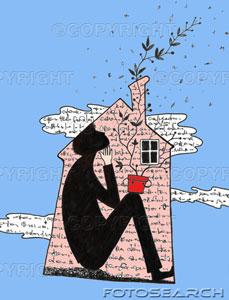 In a brave moment of honesty and bathos, the project's organisers assert that "the precise impact of the poems displayed... was always going to be hard to measure". The final report consists, as these things always do, of pages of anecdote masquerading as science, and ends with the hope that further funding be found. My heart went out to the organisers. Like most of us, they're simply doing their best in a league-table culture where everything is judged by results.
In a brave moment of honesty and bathos, the project's organisers assert that "the precise impact of the poems displayed... was always going to be hard to measure". The final report consists, as these things always do, of pages of anecdote masquerading as science, and ends with the hope that further funding be found. My heart went out to the organisers. Like most of us, they're simply doing their best in a league-table culture where everything is judged by results.
There is, in the right hands, a fine role for poetry as social work, but let's not pretend that it's the same as poetry as art. Poetry, like all art, is not a panacea. Perhaps it's more like homeopathy. A great placebo - some people swear by it - but the studies are inconclusive.
 MY WIFE ARLAINE, teasing as ever, asked me yesterday if I have anything romantically surprising for her today. Lemme see, I winked. Last year, we spent our Valentine's Day trying to steer clear from the stampede of lovers out for a candle-lit dinner. So we deemed it more spectacular to hie off at the sidewalk near the Fuente Osmeña park. There, she could only chuckle as she watched me wolfing down a burpful of balut, my lips sluicing vinegar and salt. Less costly, less cliche.
MY WIFE ARLAINE, teasing as ever, asked me yesterday if I have anything romantically surprising for her today. Lemme see, I winked. Last year, we spent our Valentine's Day trying to steer clear from the stampede of lovers out for a candle-lit dinner. So we deemed it more spectacular to hie off at the sidewalk near the Fuente Osmeña park. There, she could only chuckle as she watched me wolfing down a burpful of balut, my lips sluicing vinegar and salt. Less costly, less cliche.
Today, I risk getting a frown from her as I resort to going back to the basic, setting out to bring her a bouquet of orange and purple mums and a box of heart-shaped chocolates in motley colors. Trite, the mother of my two sons will tell me. But, as I'll retort with yet another wink, I know she'd hum along when I'll breeze through bits of a hackneyed song: The fundamental 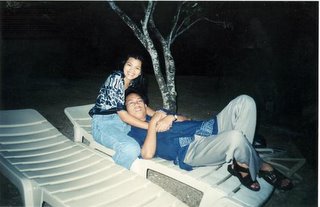 things apply as time goes by...
things apply as time goes by...
And I will tell her, too, the words still hold true out of this first poem I wrote for her six years ago:
MUSING MY ONE TRUE POEM
Unless you come into me,
I have only the heart
of a blank page. The 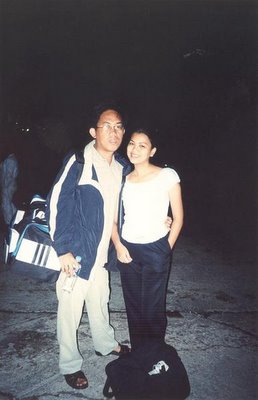 beat
beat
of metaphors tapping limp as the feet
of rain in the desert. The wreath
of smoke out of mirrors. The breath
of me disfigured of speech, spitting
shards or forking the words like a snake
from the pit of my tongue.
Until my touch becomes your second skin,
nothing can break you open or spurt
the seed of my silence into fruiting
the phrases only bees
and worms embrace. In the absence of words.
In the scent of flowers. In the flesh
of dreams where the dead can
teach me: To read with all ears the dance
of the shovel in a patch of paper
where a gardener burns the weeds
and a gravedigger whistles until
I can fill all that's hollow
and come into you.
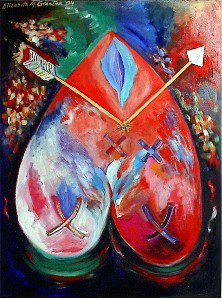 WHAT'S LOVE IF it's not something to die or kill for?
WHAT'S LOVE IF it's not something to die or kill for?
On a day like this, when the air is suffused with sweetness and light while the call of commercialism whittles down the wilderness of the heart to a cozy cage of sentiments, passion is often given a short shrift. As if it were devoid of violence out of a wrenching away from the self-centered zone of comfort. As if its beauty and tenderness weren't always threatened by danger or pain and fear of losing.
Methinks nothing's worth loving unless it spawns inside us a ruthlessness to be reckless in pursuit of our private Eden. Yes, not until it smolders enough to ignite in us a purging compulsion to endure burning. Ah, that feeling of being killed softly. Something that most love songs gloss over, sad to say.
Against the overchewed and junk-food notions of romance, here's my poem slightly revised since its publication at the Sunday Inquirer Magazine (August 27, 2000) :
PRANDIAL PIECES
I'm at your banquet because wolves
are invited, hoping your heart
is on the plate.
A toast startles you. As if stars,
falling, shattered the wine glass
you're holding.
I'll wash with the wine your bloodied
hand until your eyes suffice
to drown me.
You say the dishes are almost cold.
I reply with a burp. Suddenly,
the knife drops.
A rodent slurps on my vomit. All I care
of etiquette is when hunger devours
the heartbeat.










